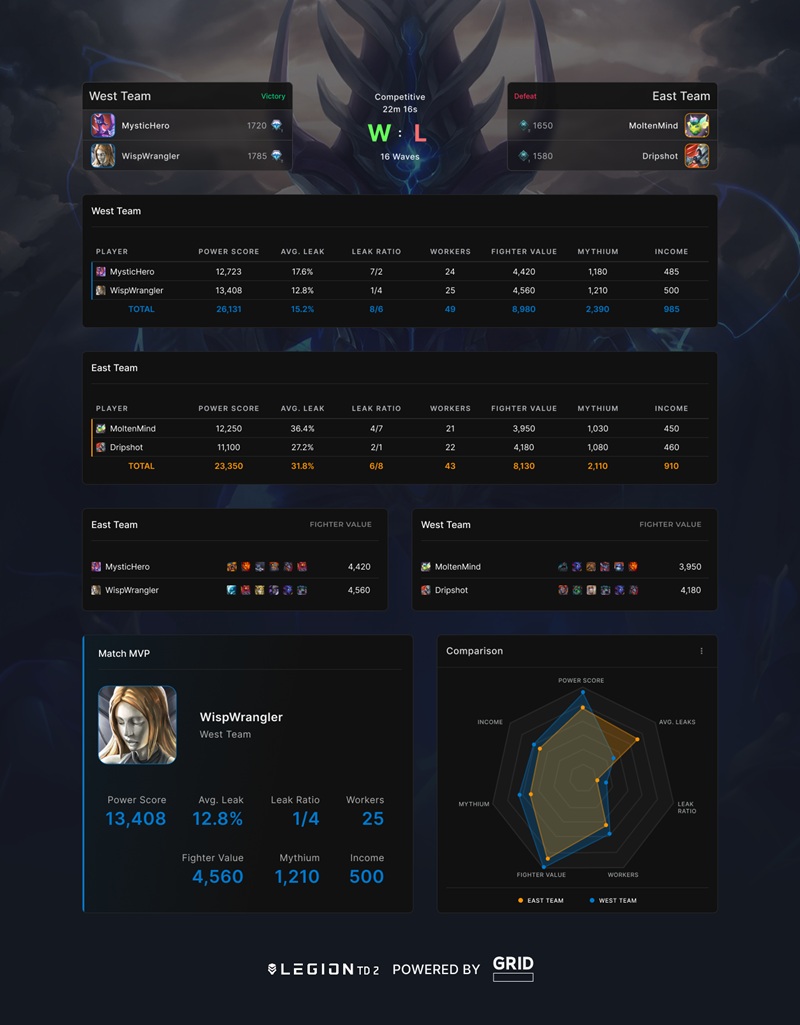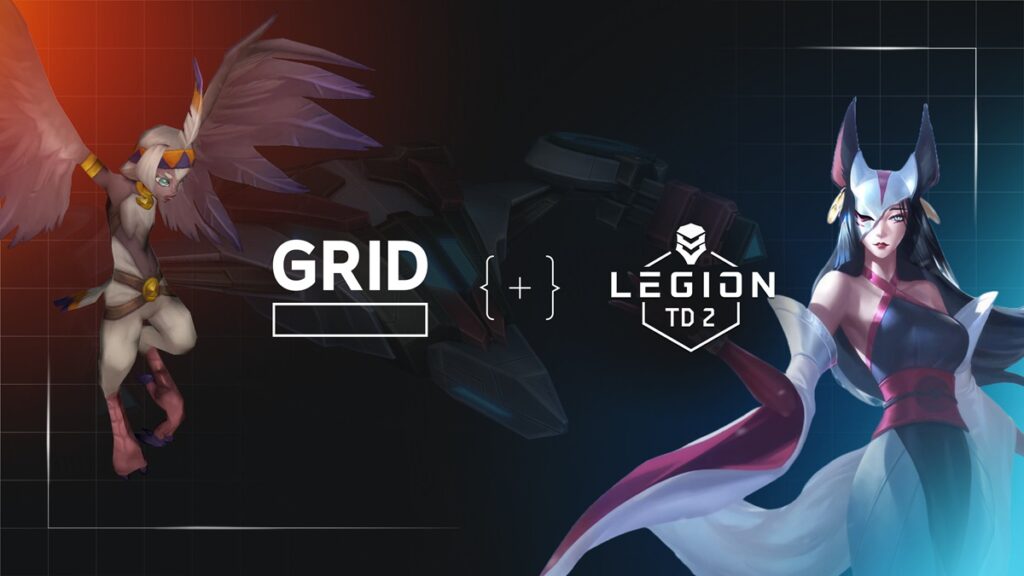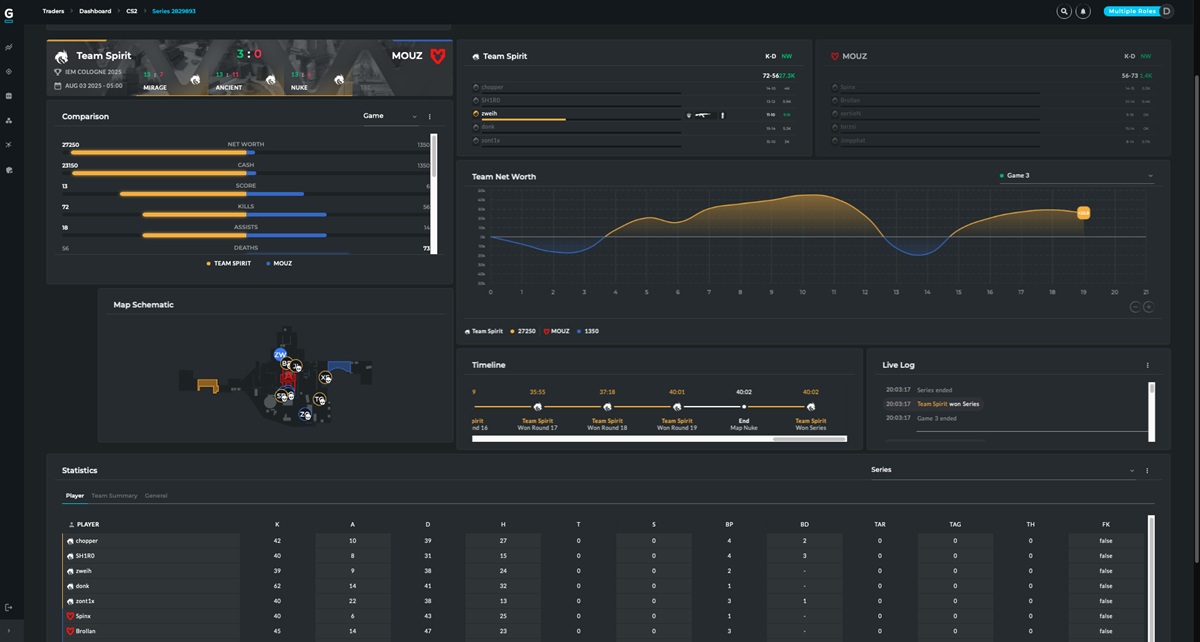With two recent deals, game data and tech firm Grid is angling to be the official provider of in-game esports data that amateur players, fans, bettors, esports stars and tournament organizers can rely upon.
Today, Grid announced it is powering the game Legion TD 2 with in-game data and community tools in a new partnership with game company Ninja Kiwi.
And a couple of weeks ago, Grid announced it had struck an exclusive multi-year data distribution partnership with ESL Face-It Group, the esports and game entertainment giant owned by Savvy Games Group.
Moritz Maurer, CEO of Grid, said in an interview with GamesBeat that the company started working first with Riot Games Valorant some years ago and then expanded to handle the data for League of Legends as well. It’s also now working with tournament organizers who handle esports for Counter-Strike and Dota 2.
“We’re super humble to be in this and the energy is good. We’re off to a great start,” said Maurer.
Regarding the ESL Face-It Group, Maurer said, “It might be quite obvious how meaningful this partnership is for us. EFG is the leader in that this space, and no one else has been in the game so long and is operating at such a scale. We’re a company that is desires to work with the biggest and best esports events on the world. We always had that vision to ultimately end up in such a partnership. And so it’s quite momentous in the context of the Esports World Cup. We couldn’t be happier.”
Starting with IEM Cologne, Grid has become the exclusive distributor, infrastructure, and integrity partner of live esports data for all EFG-operated Counter-Strike 2 and Dota 2 competitions—including landmark tournaments and leagues such as the Intel Extreme Masters (IEM), ESL Pro League, and ESL One.
In 2024, IEM Cologne drew over one million concurrent viewers and 25.5 million hours of watch time throughout the tournament in 2024.
Georg Brandes, senior director of media rights and distribution at ESL Face-It Group, said in an interview with GamesBeat that he believes that esports in general is just catching up with a lot of traditional sports.
“This means we have one big advantage compared to a lot of the traditional sports because of the sheer nature of the game. We don’t have to do something that you would call scouting in traditional sports. There is a game API that offers a very in-depth opportunity to track data throughout and obviously what we’re doing for Grid is basically giving them access to all the data of all the games, including the live broadcast,” said Brandes. “Obviously, I think it’s very important to understand that the core essence of the partnership is part of it is the integrity of the game. We’re making sure that we’re keeping everything as close as we can.”

With Ninja Kiwi, Berlin, Germany-based Grid will provide in-game data infrastructure, distribution, and community engagement solutions for Legion TD 2, the infinitely replayable multiplayer and single-player tower defense game. This partnership marks the first time Grid’s technology platform will extend beyond triple-A esports titles to serve multiplayer games and developers more broadly.
A spin‑off of the popular Warcraft III mod, Legion TD 2 has maintained a vibrant and active community since its full launch in 2021. Through this collaboration, Ninja Kiwi will unlock actionable in-game data to support new player-facing features and internal development workflows.
For participants in esports, Maurer said, “If I’m participating in tournaments at any level, I want to know that the competition is clean, that my data is being controlled in a way that my opponent potentially has no access that give them advantage. I want to make sure thesethings are well controlled. And at the same time, I want to know that forces from cheating to match fixing are being controlled.”
Controlling all of that makes esports more sustainable.
Brandes said esports has been around for a long time and the games are evolving. So the data has to be at the forefront of capturing and understanding these developments.
“We’re still at the beginning of a process that, while we’re still professionalizing the whole industry, there’s lots of learnings that we can take from traditional sports that,” Brandes said.
What Grid does
Grid is a data platform powering competitive gaming—capturing every moment and play to transform raw game data into commercial and fan-facing opportunities. It is already trusted by Riot Games, Ubisoft, Krafton, Montoon, Blast, and other rightsholders and data consumers.
Grid enables live esports tracking, casual player stat mapping, broadcast enhancements, next-gen betting, and new revenue streams across the ecosystem. By advancing technology and driving innovation, Grid is building the foundation for competitive gaming’s data-driven future. And Grid feeds the data to the ecosystem of esports.
Maurer said that the company collects hyper, granular data and it collaborates in order to make is available to any any vertical that requires data in order to operate, to power their product, to create good experiences for their fans, and ultimately feedback, engagement and participation into the game with the broadcast.
“We choose the way that we basically protect and uphold the integrity of the game. And that means controlling access to data well, controlling even to the layer of different data fields, the time at which certain data points are published, and also being, you know, very rigorous when it comes to controlling who has access to the data.”
With Grid Play, Ninja Kiwi will gain access to a full player base in-game game data for use in leaderboards, post-match breakdowns, and community dashboards; a developer portal with data access and analytics tools—including player behavior and game engagement—to improve decision-making and development efficiency; and data infrastructure that supports new content layers and future use cases.
“Grid Play was designed to let developers focus on making great games, not managing complex data,” said Grid CTO and cofounder Chris King in a statement. “The AutoAttack Games team at Ninja Kiwi has developed a game with a passionate player base and strong community-driven ecosystem behind it—qualities where reliable data infrastructure and insightful player stats can add meaningful value.”
“Grid’s tools give us a ton of valuable data on thousands of matches played every day, which collectively unlocks deeper gameplay insights for both our players and our team,” said AutoAttack Games CEO Brent Batas, in a statement. “As we share Grid data with our playerbase, we can better showcase the unparalleled gameplay depth of Legion TD 2, and the same data will also help guide our business and development decisions moving forward.”
Big collaborations and lots of data

This collaboration marks the first official integration of Grid Play—a new offering designed specifically for indie developers to track the full playerbase in-game data. Built on Grid’s proven technology and expertise trusted by the industry leaders such as Riot Games, Krafton, or Ubisoft, Grid Play enables games of all sizes to access, leverage, and commercialize the full extent of their game data, without the added complexity and engineering resources.
Grid Play is already live in Legion TD 2, and full leaderboard and stats features will launch later this summer.
Brandes said ESL Face-It Group can officiate its own games. This deal is more like thinking about the play by play data, deep statistics, and then other layers of interpretation, like insights or live predictions.
“And these types of products are useful for coaching, for turn scouting, in some cases, but primarily useful for regulated betting that relies on the state, especially for live betting, but then also for a lot of cool things on the broadcast innovation and fan engagement side and community side,” Maurer said.
The goal is to improve the experience, engage tha fans, tell better stories, and create more appealing ways other brands can be reached through the events, Maurer said.
Thanks to the Esports World Cup and ESL Face-It Group, Grid has access to some of the largest game developers and multi-year exclusive arrangements to the extent that it has built out the APIs and the piping for the data in the first place, Maurer said.
“The vision was always to create a game-title-agnostic framework that operates well across the main genres,” he said. “The sheer amount of the data is just something that’s exciting. And you know, in the context of AI and machine learning — we’ve been using AI for seven years. We have proven methods.”
Maurer notes that games are evolving all of the time and at a significant pace compared to traditional sports.
For players, this means dealing with a lot of change.
“If you want to continue to compete at the highest level, you also have to develop an ability to adapt and do it in a fast and efficient way. And ultimately, that’s something we provably can accelerate and underscore for all stakeholders.”
Elsewhere it the market, there are companies relying on scraping methods and they don’t care about rights holders and were selling unofficial data. Now Grid has such a consolidated portfolio of esports assets across all relevant games that this isn’t necessary anymore, Maurer said.
With the official data, Grid has “qualitatively unassailably superior compared to anything scraped from an accuracy, speed and granularity perspective,” Maurer said.



